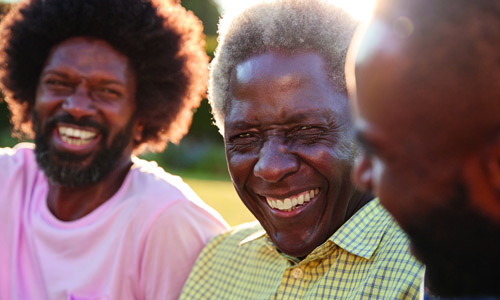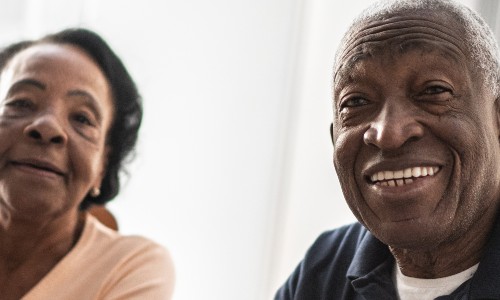The theme for Black History Month in the UK this year is ‘Time for Change: Action Not Words’. I’ll try to limit my words, then, as I encapsulate Age UK’s recent actions on racial equity.
This year’s theme is a powerful reminder that learning is in vain if it's not put into practice. Age UK is committed to acting, both as a charity for older people and as an employer, to improve racial equity for our colleagues and for the older people we seek to support. We continue to take steps to build a more complete picture of the challenges faced by Black older people, to effectively respond to those challenges, and to strive to be an inclusive employer.
A disproportionate level of need
Black older people currently make up a small percentage of all older people in the UK – 1 in 70 people over the age of 60 (1.4%) – but are disproportionately affected by the challenges of later life. The inequalities we see between older people of different ethnicities are born from lifetimes of inequalities – for example in employment opportunities, access to secure housing, and ability to maintain good health. They are the result of longstanding injustices that are part of our history as a nation and are ongoing today.
Official statistics published by the Department for Work and Pensions tell us that 30% of Black pensioners are living in poverty, almost double the percentage of White pensioners living in poverty (16%). And researchers from King’s College London have shown that rates of poor health in Black Caribbean older people are equivalent to the rates of poor health in White British people who are 10 years older.
It is clear there are many Black older people around the UK facing the challenges of later life that Age UK offers support with. As Age UK seeks to reach the older people who need us most, one of our key recent actions has been to establish who is accessing the Age UK Advice Line and website; 2% of respondents to our survey of more than 2,000 people using our website told us they were Black. Similarly, research on 225 people who called the Age UK Advice Line found that 2% of callers were Black.
These figures suggest that many of the Black older people most in need of our services aren’t currently accessing them. If we were meeting the needs of all races equally, we would expect a higher proportion of our users to be Black.
An incomplete picture
But we have also found that existing research and statistics don’t tell us everything we need to know about the lives of Black older people; there are significant data gaps. It is often the case that surveys simply don’t include enough Black older people to allow meaningful insights.
To help to fill these gaps, last year Age UK commissioned independent researchers to interview 500 older people from the UK’s ethnic minority populations, 200 of whom were Black. We asked about the issues that Age UK supports older people with – including health and care needs, managing money, digital confidence, and loneliness; 10% of Black Caribbean and 13% of Black African older people we spoke told us they were often or always lonely, higher than the 7% of older people who are often or always lonely in the general population.
We also asked where interviewees would turn to for advice, information or support around ageing, and none of the 200 Black older people we spoke to suggested Age UK. Furthermore, 55% said they hadn’t heard of Age UK. There’s evidently interest in engaging, though, as when they were told about the charity, 58% of the Black older people we spoke to said they would consider contacting Age UK for help.
Showing we’re there
Knowing that many Black older people are faced with challenges Age UK can support with, how do we make our services more accessible to Black older people, their families, and carers? Considering that more than half of the Black older people we spoke to weren't aware of Age UK, we need to increase awareness of who we are and what we do, because we can’t assume all older people know we’re there for them.
Secondly, to make Age UK an inclusive source of information and support, we need to ensure we continue to listen to and learn from the lived experiences of our beneficiaries. What do Black older people who have used our services think of them? What were the initial barriers to contacting Age UK? How do the challenges of later life impact Black older people?
We will commission further research to help us to answer these questions. These are also questions we must ask of our storytellers, the older people who share their experiences and challenges with us. And by continuing to strengthen our engagement with the local Age UK charities, which have strong ties with their local communities, we will improve the depth of our insights and the visibility of a greater array of stories.
As well as wanting to be an inclusive source of information and support for older people and their loved ones, Age UK wants to be an inclusive employer. Currently, less than 2% of Age UK staff who have told us their ethnicity say that they are Black, and 8% say that they are of a minority ethnicity. Over the past two years, all Age UK staff have been provided Conscious Inclusion Training, to help with acknowledging unconscious biases and ensure we have a working culture to makes everyone feel included. We’re also reviewing our Equality, Diversity & Inclusion strategy to build a solid framework around the initiatives we’ve introduced in our efforts to become a more inclusive employer.
We acknowledge that our work as an organisation in striving towards race equity is incomplete. There remain challenges to be carried forward by our new CEO, Paul Farmer, who starts at Age UK at the end of October along with our new Head of Equality, Diversity and Inclusion who joined us in September. Paul is keen to engage with this work and incorporate the many valuable insights from his 16 years as the CEO at Mind, the mental health charity.
While we are glad of the opportunity Black History Month offers us to take stock of the progress we have made and have yet to make, it’s vital that Age UK is committed throughout the year to being an inclusive source of information and support for Black older people, their families and loved ones.





